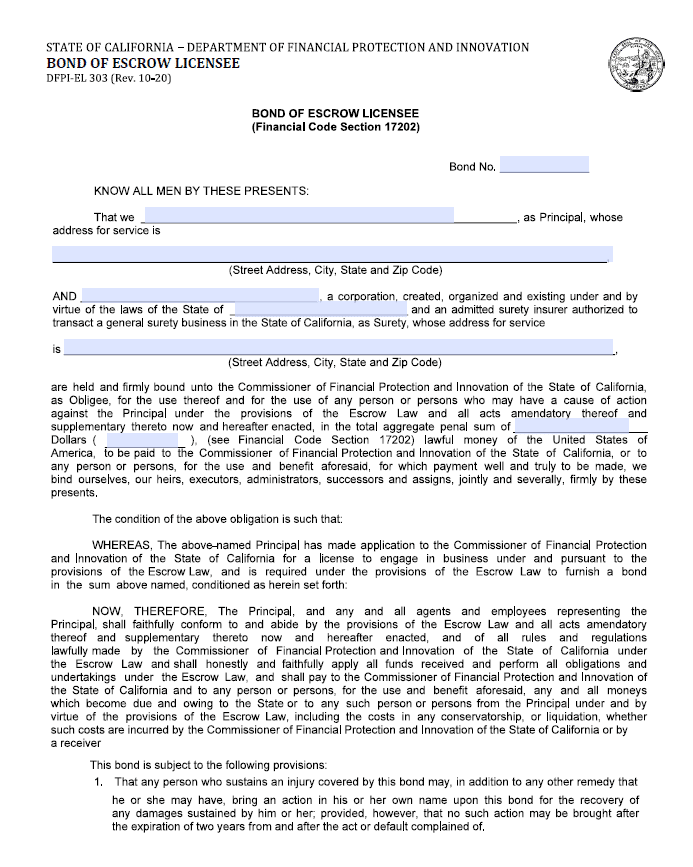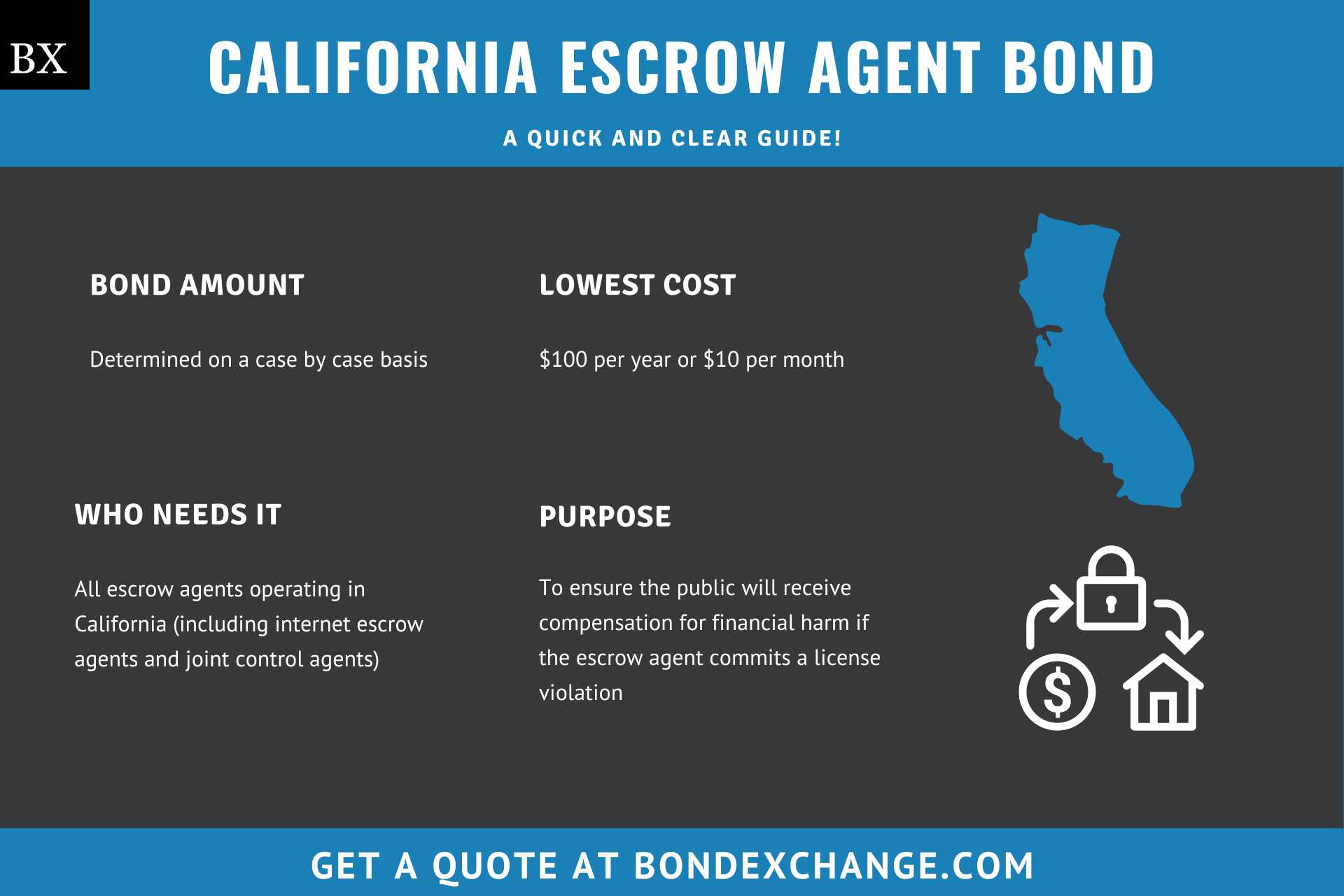California Escrow Agent Bond: A Comprehensive Guide
This guide provides information for insurance agents to help customers obtain a California Escrow Agent bond.
At a Glance:
- Lowest Cost: $100 per year or $10 per month
- Bond Amount: Determined by the agent’s average trust liability (more on this later)
- Who Needs It: All escrow agents operating in California (including internet escrow agents and joint control agents)
- Purpose: To ensure the public will receive compensation for financial harm if the escrow agent commits a license violation
- Who Regulates Escrow Agents in California: The California Department of Financial Protection and Innovation

Background
California Financial Code Sections 17200-17215 require all escrow agents operating within the state to obtain a license from the Department of Financial Protection and Innovation. The California legislature enacted the licensing requirement to ensure escrow agents do not engage in unethical business practices. To provide financial security for enforcing licensing laws, escrow agents must purchase and maintain a surety bond to be eligible for licensure.
What Is the Purpose of a California Escrow Agent Bond?
California requires all persons or companies that provide escrow services in the state to purchase a surety bond as part of the application process to obtain a business license. The bond protects the public from losses should the escrow agent fail to abide by the regulations outlined in California Financial Code Section 17000 et seq. Specifically, the bond protects claimants if the escrow agent acts negligently, commits fraud, or engages in unfair business practices. In short, the bond is a type of insurance that protects the public if the escrow agent violates the terms of their license.
How Can an Insurance Agent Obtain a California Escrow Agent Surety Bond?
BondExchange makes obtaining an California Escrow Licensee bond easy. Simply log in to your account and use our keyword search to find the “escrow agent” bond in our database. Don’t have a login? Gain access now and let us help you satisfy your customers’ needs. Our friendly underwriting staff is available by phone at (800) 438-1162, email, or chat from 7:30 AM to 7:00 PM EST to assist you.
At BondExchange, our 40 years of experience, leading technology, and access to markets ensures that we have the knowledge and resources to provide your clients with fast and friendly service whether obtaining quotes or issuing bonds.
Not an agent? Then let us pair you with one!
Click the above image to find a BX Agent near you
How Is the Bond Amount Determined?
California Financial Code Section 17202 dictates that the limit of the California Escrow Agent bond is to be determined by the average trust liability of the licensee, as outlined below:
- $25,000 bond limit if 150% of the previous year’s average annual trust fund obligations equals $250,000 or less
- $35,000 bond limit if 150% of the previous year’s average annual trust fund obligations equals at least $250,001 but not more than $500,000
- $50,000 bond limit if 150% of the previous year’s average annual trust fund obligations equals $500,001 or more
A $25,000 standard limit is mandated for first-time licensees. For additional licensed locations, the bond amount is increased by $5,000 per location.
Is a Credit Check Required for the California Escrow Agent Bond?
Surety companies will run a credit check on the escrow licensee to determine eligibility and pricing for the California Escrow Agent bond. Escrow agents with excellent credit and work experience can expect to receive the best rates. While escrow agents with poor credit may be declined by some surety companies or will have to pay higher rates. The credit check is a “soft hit”, meaning that the credit check will not affect the applicant’s credit.
How Much Does the California Escrow Agent Bond Cost?
The California Escrow Licensee bond can cost between $100 to $875 per year or $10 to $88 per month. Insurance companies determine the rate based on several factors including your customer’s credit score and experience. The charts below briefly references the approximate bond cost on the various bond limits.
$25,000 Escrow Agent Bond Cost
| Credit Score* | Bond Cost (1 Year) | Bond Cost (1 month) |
|---|---|---|
| 720+ | $100 | $10 |
| 680 – 719 | $113 | $12 |
| 660 – 679 | $175 | $18 |
| 649 – 659 | $250 | $25 |
| 629 – 648 | $375 | $38 |
| 600 – 628 | $625 | $63 |
| 580 – 599 | $875 | $88 |
| 550 – 579 | $1,000 | $100 |
| 525 – 549 | $1,250 | $125 |
| 500 – 524 | $1,500 | $150 |
$35,000 Escrow Agent Bond Cost
| Credit Score* | Bond Cost (1 Year) | Bond Cost (1 month) |
|---|---|---|
| 720+ | $132 | $14 |
| 680 – 719 | $210 | $21 |
| 660 – 679 | $245 | $25 |
| 649 – 659 | $350 | $35 |
| 629 – 648 | $525 | $53 |
| 600 – 628 | $875 | $88 |
| 580 – 599 | $1,225 | $123 |
| 550 – 579 | $1,400 | $140 |
| 525 – 549 | $1,750 | $175 |
| 500 – 524 | $2,100 | $210 |
$50,000 Escrow Agent Bond Cost
| Credit Score* | Bond Cost (1 Year) | Bond Cost (1 month) |
|---|---|---|
| 720+ | $188 | $19 |
| 680 – 719 | $225 | $23 |
| 660 – 679 | $350 | $35 |
| 649 – 659 | $500 | $50 |
| 629 – 648 | $750 | $75 |
| 600 – 628 | $1,250 | $125 |
| 580 – 599 | $1,750 | $175 |
| 550 – 579 | $2,000 | $200 |
| 525 – 549 | $2,500 | $250 |
| 500 – 524 | $3,000 | $300 |
*The credit score ranges do not include other factors that may result in a change to the annual premium offered to your customers, including but not limited to, years of experience and underlying credit factors contained within the business owner’s credit report.
How Does California Define “Escrow Agent”?
To paraphrase California Financial Code Section 17004, an escrow agent is any individual or business entity that holds property in a trust for a third party until certain conditions have been met. For example, when an individual is purchasing a house, an escrow agent will hold onto the title to the property and the initial down payment until both the buyer and seller meet all of their contractual obligations.
Exemptions to these definitions include:
- Banks, trust companies, building/loan or savings/loan associations, credit unions, or insurance companies
- Licensed attorneys performing their regular duties
- Licensed abstractors performing title searches for the issuance of a title insurance policy
- Licensed real estate brokers
BondExchange now offers monthly pay-as-you-go subscriptions for surety bonds. Your customers are able to purchase their bonds on a monthly basis and cancel them anytime. Learn more here.
How Do Escrow Agents Apply for a License in California?
Escrow agents in California must navigate several steps to obtain a license. Below are the general guidelines, but applicants should refer to the Department of Financial Protection and Innovation’s Escrow Law webpage for details on the process and access to all necessary forms.
Applicants may utilize the Self-Service DOCQNET Portal to submit applications for licensure and view the status of applications.
Step 1 – Purchase a Surety Bond
Escrow agents operating in the State of California must purchase and maintain a surety bond (limits outlined above). Additionally, escrow agents will need to purchase liability coverage or a separate fidelity bond to join the Escrow Agents’ Fidelity Corporation.
Step 2 – Complete the Application
The following completed forms are required as part of the application process:
- Application for License Under Escrow Law
- Proof of membership in Escrow Agents’ Fidelity Corporation
- Original signed and sealed surety bond
- Proof of minimum financial requirements (liquid assets in excess of current liabilities of $25,000 and tangible assets in excess of total liabilities of $50,000)
- Background check
- Proof of a manager with at least 5 years of responsible escrow experience at each location during office hours
- Signed affidavit
- $625 application fee and a $100 investigation fee
Escrow agents must submit a branch office application for each additional location they operate.
What Are the Insurance Requirements for Escrow Agents in California?
California does not require escrow agents to purchase any form of liability insurance as a prerequisite to obtaining a license. In this case, escrow agents are only required to purchase and maintain a surety bond. Additionally, escrow agents will need to purchase liability coverage or a separate fidelity bond if they are planning to join the Escrow Agents’ Fidelity Corporation.
How Do California Escrow Agents File Their Bonds?
Escrow agents should submit their completed bond forms, including the power of attorney, electronically when submitting their license applications to the California Department of Financial Protection. The surety bond requires signatures from the surety company, as well as the escrow agent. The surety company should include the following information on the bond form:
- The legal name of the individual buying the bond
- Surety company’s name
- Date the bond is signed
What Can California Escrow Agents Do to Avoid a Claim Against Their Surety Bond?
The easiest way to avoid a claim as an escrow agent is to comply with all applicable license regulations. Common violations that can cause an official bond claim are listed below:
- Negligence
- Default
- Misrepresentation
- Fraud
For example, failure to maintain accurate/current accounting and finance records of all business transactions is subject to a negligence violation. If the violation remains unresolved by the licensee, a bond claim may be filed.
What Other Insurance Products Can Agents Offer Escrow Agents in California?
California does not require escrow agents to obtain any form of liability insurance. However, most reputable businesses will seek to obtain this insurance anyway, and some may opt to purchase this insurance to satisfy the Escrow Agents’ Fidelity Corporation’s admission requirements. Bonds are our only business at BondExchange, so we do not issue liability insurance, but our agents often utilize brokers for this specific line of business. A list of brokers in this space can be found here.
How Can Insurance Agents Prospect for California Escrow Agent Customers?
California unfortunately does not provide a public list of active escrow agents in the state. The state does have a database of all licensed agents, but you must know the agent’s business name or license number to find their information. We suggest contacting the Department of Financial Protection and Innovation to obtain a list of licensed escrow agents. Contact BondExchange for additional marketing resources. Agents can also leverage our print-mail relationships for discounted mailing services.


